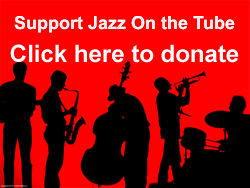Artist-Educators, Jazz on the Tube Interview, Podcasts
David Amram’s passion for music is infectious.
If you want a first-hand insider’s account of what it was like to hang out with Charles Mingus, Miles Davis, Charlie Parker, and a whole host of other famous jazz musicians, this one is not to be missed!
– Ken McCarthy
Jazz on the Tube
P.S. Our unique programming is made possible by help from people like you. Learn how you can contribute to our efforts here: Support Jazz on the Tube
Thanks.
Jazz on the Tube Interview, Podcasts, Producer-Presenters
Long-time Jazz on the Tube subscribers know we have been dedicated advocates to the idea that arranger/composer/music director/ amplified guitar pioneer/trombone virtuoso Eddie Durham deserves a much higher profile among jazz fans and jazz students than his memory currently enjoys.
How high?
It’s time that he be placed at the level of Duke Ellington and other ESSENTIAL masters of the art.
As an important step in that direction, we’re delighted to announce a MAJOR documentary on Eddie’s life and music that launches tomorrow February 1, 2024.
Details and an informative wide-ranging interview.
Watch the interview above, and for more info on the documentary, click this link.
– Ken McCarthy
Jazz on the Tube
P.S. Our unique programming is made possible by help from people like you. Learn how you can contribute to our efforts here: Support Jazz on the Tube
Thanks.
Music credit: The Jazz on the Tube podcast theme song is “Mambo Inferno” performed by The Manhattan School of Music Afro-Cuban Jazz Orchestra conducted by Bobby Sanabria from the CD ¡Que Viva Harlem!
Artist-Educators, Jazz on the Tube Interview, Podcasts
If you’re around 64 or older you probably remember the shock of the 1968 Olympic leap of Bob Beamon when it happened.
He didn’t just win the gold, he also shattered the world record – and 56 years later it’s still the Olympic record.
What you probably didn’t know, and I didn’t know until very recently, is that Bob has had a passion for Afro-Caribbean music since he was 9 years old growing up in the projects in South Jamaican, Queens.
But he was more than just a fan. Until he went to college and shifted his attention to sports, he was on track to become a professional musician.
Now at 77, he’s playing again. In a band and is on his first CD.
Complete interview – December 29, 2023
– Ken McCarthy
Jazz on the Tube
P.S. Our unique programming is made possible by help from people like you. Learn how you can contribute to our efforts here: Support Jazz on the Tube
Thanks.
Music credit: The Jazz on the Tube podcast theme song is “Mambo Inferno” performed by The Manhattan School of Music Afro-Cuban Jazz Orchestra conducted by Bobby Sanabria from the CD ¡Que Viva Harlem!
Chroniclers, Jazz on the Tube Interview, Podcasts
Treme’s Petit Jazz Museum
1500 Governor Nicholls St, New Orleans, LA 70116
(504) 715-0332
More details
Website with reviews
– Ken McCarthy
Jazz on the Tube
P.S. Our unique programming is made possible by help from people like you. Learn how you can contribute to our efforts here: Support Jazz on the Tube
Thanks.
Music credit: The Jazz on the Tube podcast theme song is “Mambo Inferno” performed by The Manhattan School of Music Afro-Cuban Jazz Orchestra conducted by Bobby Sanabria from the CD ¡Que Viva Harlem!
Artist-Educators, Jazz on the Tube Interview, Podcasts
Vox Humana and the Multiverse Big Band
Recorded Live in New York City at Club Dizzy (2022).
Featuring: Vocalists Janis Siegel (Manhattan Transfer), Antoinette Montague, and Jennifer Jade Ledesna.
Be a jazz activist.
1. You can order Vox Humana here.
2. Call your favorite jazz radio DJ and ask him or her to play a cut from the album.
3. Upcoming live shows.
September 30
Grace Farm – New Canaan, CT
Tickets
October 11
Interchurch Center – New York City (Free)
Tickets
October 14
True Blue Jazz Festival
Tickets
A Taste
– Ken McCarthy
Jazz on the Tube
P.S. Our unique programming is made possible by help from people like you. Learn how you can contribute to our efforts here: Support Jazz on the Tube
Thanks.
Music credit: The Jazz on the Tube podcast theme song is “Mambo Inferno” performed by The Manhattan School of Music Afro-Cuban Jazz Orchestra conducted by Bobby Sanabria from the CD ¡Que Viva Harlem!
Artist-Educators, Jazz on the Tube Interview, Podcasts
Jazz fans who know even the smallest amount of jazz history know the important role church music played in the music’s development.
Everyone from Louis Armstrong to Ornette Coleman has acknowledged the DEEP impact the music of the church had on their art.
Less known is the huge contemporary role gospel plays not only in training young musicians, many of whom become jazz players but also in being an engine of innovation for the music itself.
If you’re a keyboard artist and are inspired to learn more…
Click here to learn how you can study with Sean.
– Ken McCarthy
Jazz on the Tube
P.S. Our unique programming is made possible by help from people like you. Learn how you can contribute to our efforts here: Support Jazz on the Tube
Thanks.
Music credit: The Jazz on the Tube podcast theme song is “Mambo Inferno” performed by The Manhattan School of Music Afro-Cuban Jazz Orchestra conducted by Bobby Sanabria from the CD ¡Que Viva Harlem!


 Louis Armstrong
Louis Armstrong